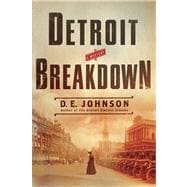
D. E. Johnson, a graduate of Central Michigan University, is a history buff who has been writing fiction since childhood. He comes by his interest in automotive history through his grandfather, who was the vice president of Checker Motors. Johnson is also the author of The Detroit Electric Scheme and Motor City Shakedown and lives with his family near Kalamazoo, Michigan.
Praise for D. E. Johnson:
Motor City Shakedown
“The scenes of Motor City, riding high on the industrial wave, are extraordinarily vivid.”
---The New York Times Book Review
“Johnson’s vibrant follow-up to The Detroit Electric Scheme delivers razor-sharp depictions of the Motor City. Johnson brings the turbulence and rampant corruption of the era to life through his flawed yet tenacious lead in this worthy successor to his debut.”
---Publishers Weekly (starred review)
“If Dennis Lehane was from Detroit, this is the book he’d write. The Motor City was once the most important city in the world, and D. E. Johnson does a masterful job at making that time and place come alive on the page. Motor City Shakedown is as hard and tough and downright noir as anything I’ve read in recent memory, but it’s got a beating heart, too.”
---Steve Hamilton, Edgar Award–winning author of The Lock Artist
“Superb.”
---National Review
“Johnson’s . . . clever weaving of history with intriguing characters makes for an exciting read.”
---Kirkus Reviews
The Detroit Electric Scheme
“The surprise ending leaves you gasping and shaking your head at Johnson’s masterful plotting and the menacing tension that forces otherwise good characters to behave despicably. Every bit as powerful as Patricia Highsmith’s Ripley series, this gem of a debut showcases an author to watch very closely.”
---Booklist (starred review)
“An empathetic hero and an abundance of interesting historical detail should keep readers engaged.”
---Kirkus Reviews
“Full of nonstop action, plot twists and turns, and great insight into the early history of the U.S. car industry, this debut is part coming-of-age tale and part historical mystery. Essential for historical fans.”
---Library Journal
“Absorbing.”
---The Seattle Times
The New copy of this book will include any supplemental materials advertised. Please check the title of the book to determine if it should include any access cards, study guides, lab manuals, CDs, etc.
The Used, Rental and eBook copies of this book are not guaranteed to include any supplemental materials. Typically, only the book itself is included. This is true even if the title states it includes any access cards, study guides, lab manuals, CDs, etc.